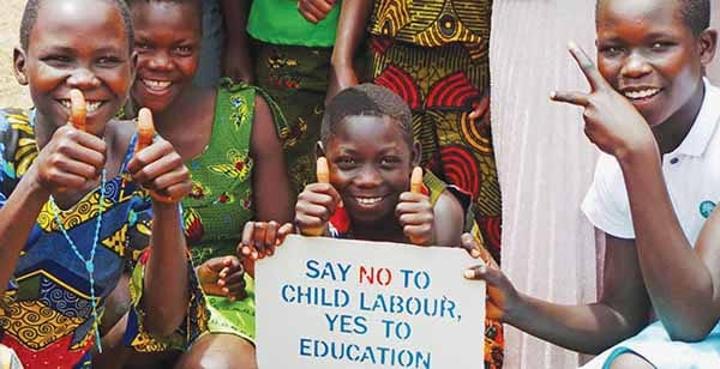Africa-Press – Lesotho. Poverty often pushes children to work, especially in atypical sectors like domestic work, prostitution and livestock rearing. Yet, when these children leave school early to enter the labour market they are more likely to dig themselves deeper into poverty than find a way out of their parlous situation.
Analysts this week raised the alarm at this growing trend, arguing if unchecked the deleterious effects of child labour could create a generation of unskilled prodigals in Lesotho. This scary spectre of Lesotho creating a lost generation is only dwarfed by raging debate on which one trumps the other – child work or child labour.
In traditional African societies, children are assigned household chores as part of their socialisation, setting these communities on a collision course with modern societies which define paid work involving children as child labour and therefore unlawful.
To settle this raging debate the Ministry of Labour has cobbled a set of guidelines intended to delineate the differences between the two competing forms of work.
“The guidelines are prepared against the background that research has showed that a number of people in Lesotho, still could not make a vivid distinction between the concepts of ‘child work’ and ‘child labour’, that is, between work that is not harmful and acceptable as part of socialisation and those forms of work that are hazardous and exploitative.
“This lack of conceptual clarity has sometimes led to the widespread denial that there is a problem of child labour in Lesotho and on other occasions it has led to the failure to recognise that some of the forms of child labour found in this country can be relegated as the worst forms (hazardous and exploitative),” the guidelines read.
Also, the Child Protection and Welfare Act 2011 (Children’s Act) emphasises in dealing with children, whether they be herdboys or not whatever is done for or to the child should be in the child’s best interests.
Actions done must also consider a child’s evolving capacity. It is with these principles in mind that work that children do should be looked at, analysts said. The Labour Code, the Children’s Act, and the two ILO child labour Conventions fix the minimum age for hazardous work at 18 years.
Article 4 of Convention 182 calls on ratifying states to establish an official list of hazardous activities prohibited to children below the age of 18 years, after consultation with the organisations of employers and workers concerned.
The ILO Worst Forms of Child Labour Recommendation, No. 190, which accompanies Convention 182, defines hazardous work to include: work which exposes children to physical, psychological or sexual abuse; work underground, under water, at dangerous heights or in confined spaces; work with dangerous machinery, equipment and tools, or which involves the manual handling or transportation of heavy loads.
Additionally, it forbids children from working in an unhealthy environment which may, for example, expose children to hazardous substances, agents or processes, or to temperatures, noise levels, or vibrations damaging to their health; working under particularly difficult conditions such as work for long hours or during the night or work where the child is unreasonably confined to the premises of the employer.
The Children’s Act considers herding a hazardous activity when it is done at a cattle post, leaving a large number of boys who are involved in herding in equally hazardous conditions while still living at home, outside the protection of the law.
In Lesotho’s mountainous rural terrain children walk long distances alone, sometimes at risk of being attacked by stock thieves. The child labour guidelines note that an employer who engages a herd boy must ensure that the herd boy’s chief is aware of the employment contract so that in the event of a dispute the chief can intervene.
However, in some instances herdboys and parents prefer to be paid in livestock. “Where a herd boy leaves an employer’s employ before he completes one year of service, which would entitle him to a cow, the monetary value has to be prorated and a herd boy accordingly paid.
“Herd boys are expected to perform all the traditional duties of a herd boy. This includes looking after livestock, taking care of the livestock’s developmental needs like getting fodder for it and the general upkeep thereof.
A herd boy, like the family children, is expected to perform other duties as may be assigned to him from time to time. “Under no circumstances should a herd boy be used as a security guard for the livestock.
“Employers or any person should not beat up herd boys. They should be treated with respect and afforded the children’s protection and rights that other children have,” the guidelines read.
It adds that children under the age of 13 years should, in line with the education policy, be at school and should not herd livestock except under the supervision of an adult.
Children below the age of 15 years should not herd in remote areas that are far or out of sight of parents, employers or adults or where they are likely to be attacked by stock thieves.
Despite these clear guidelines Police Public Relations Officer Superintendent Mpiti Mopeli said his office handles an alarmingly high number of child labour cases.
“The Children’s Act protects children from child labour and anyone that engages underage children into labour practices is subject to punishment and will therefore come before the courts of law,” Mopeli said.
But what has contributed to the increase in these cases? Development for Peace Education (DPE) researcher Mosala Mokutlulu attributed the spike in child labour cases to unemployment and the social milieu children grow up in.
He said poverty forces parents to allow their children to leave school to work so there can be food for the family. Mokutlulu said parents normally find themselves wedged between a hard place and a rock where education and starvation are concerned.
To most, it was a no brainer they would opt to allow their children to work. Mokutlulu further noted that children who grow up in areas where herding livestock and agriculture are prioritised more than education, they tend to follow in the footsteps of their fathers who they idolise.
“A child that grows up in an environment where having a lot of cows, goats and sheep is an achievement tends to also want to be a renowned livestock farmer and works hard towards his dream even if it means being hired at a tender age to herd other people’s livestock,” Mokutlulu said.
These children do not see any value in education as they consider livestock farming as their only ticket to a brighter future. But the pitfall to this age-old escape route out of poverty for most rural children is that some end up in bonded labour, as their employers’ capitalise on their vulnerability.
This scourge notwithstanding, Mukutlulu added that child labour also promotes a dependence syndrome which is difficult to shake off if not addressed promptly.
“The children become dependent on others even when they are grown-ups and will be hired by children even younger than them (on poor wages),” he said.
He said the solution to child labour could be creation of enduring and well-paying jobs for all. “Children from an early age should also be guided and taught about the importance of job creation to avoid dependency,” he said.
Psychologist Mokhali Mokhu agrees with Mukutlulu adding child labour denies children the chance to develop physically because of the back-breaking chores they perform.
Also, Mokhu noted child labour deprived children of vital leisure time which is important in their development. In some instance, child workers turn to deviant behaviour, including drug abuse, after being forced to live like grown-ups early.
Mokhu said as these children age, it becomes difficult to discipline them since they were conditioned to believe that they are mature enough to take care of themselves.
“If one is not intellectually unstable, they can even opt for risky sexual behaviour as a means to calm their stressful situation.
“Child labour deprives one of the chance to have a bright future because they do not have equal opportunities like other children,” Mokhu said.
In a bid to roll back this spreading phenomenon, Help Lesotho has launched programmes to empower herd boys and teach them about their rights, responsibilities and gender-based violence.
Country director Shadrack Mutembei said they also teach herdboys life skills and problem-solving skills to eradicate poverty in their communities and hopefully stamp out child labour.
However, Thabiso Mats’osa, 53, is ambivalent about the narrative that out rightly condemns child labour arguing, instead, for a measured approach to the niggling issue.
Child labour, he noted, was alien to Africans, adding when he was growing up, he used to be hired by livestock farmers and was paid with livestock or food.
Even though he was supposed to be in school, he felt honoured to have the chance to fend for his struggling family. He admitted that although times have changed, a lot of children still work as livestock herders, so their families can survive. Mats’osa, however, added it is not acceptable for children to be taken out of school to work, adding the children could both work and study.
For More News And Analysis About Lesotho Follow Africa-Press






